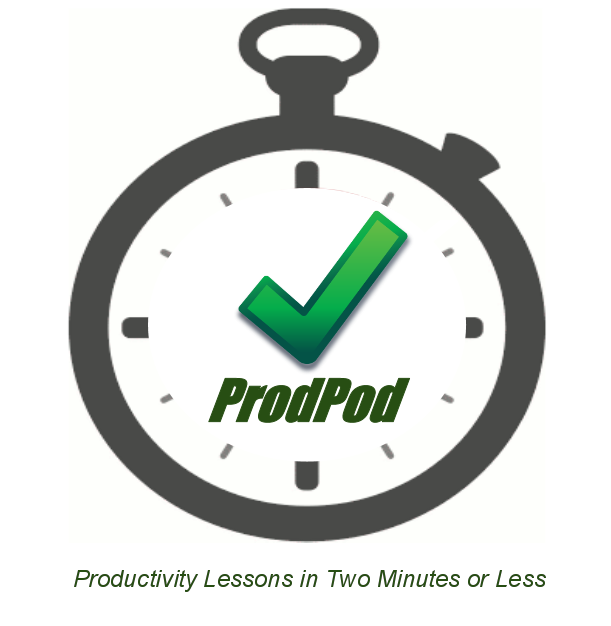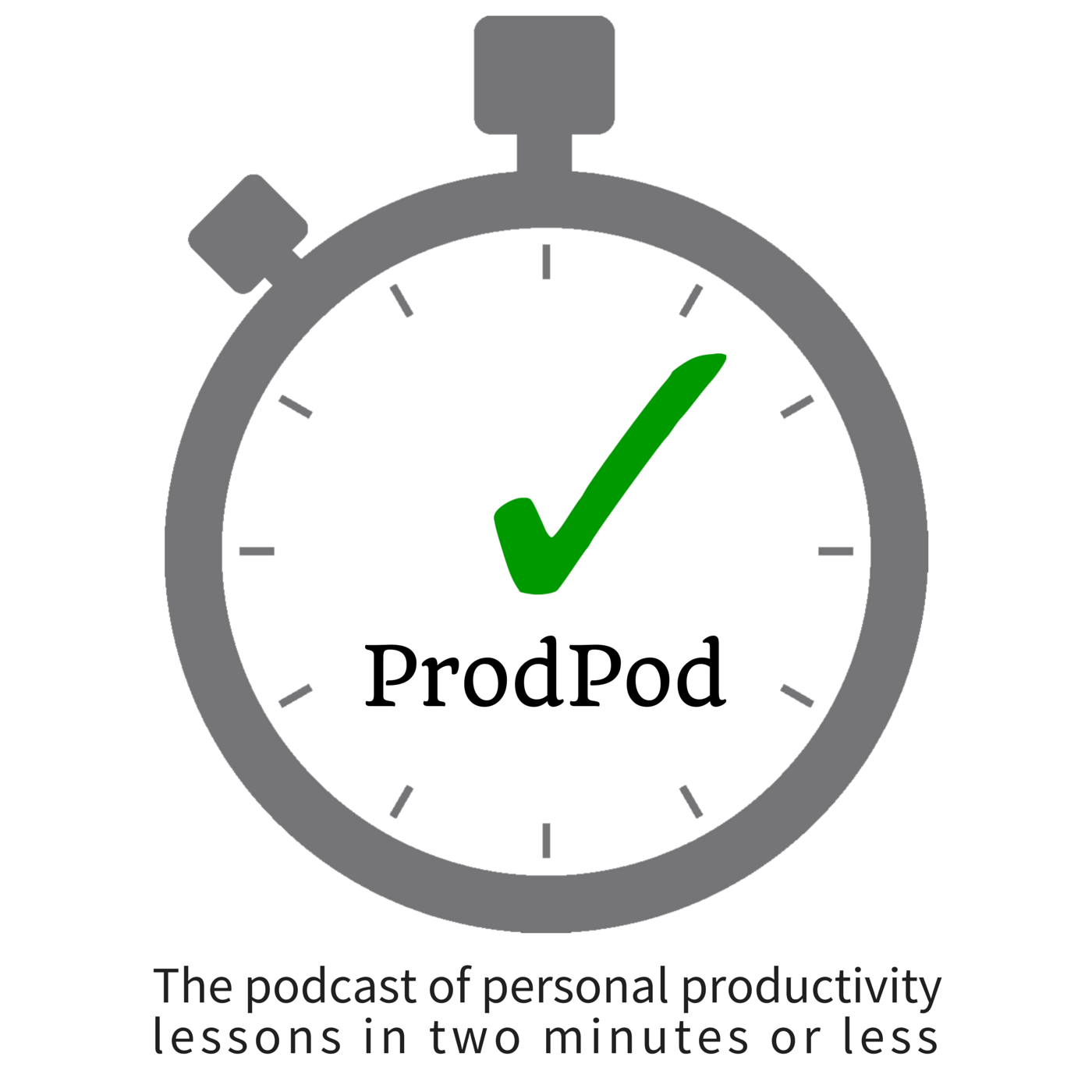Episodes

Tuesday Aug 30, 2011
ProdPod: Episode 16 -- To Change Productivity Systems, or Not?
Tuesday Aug 30, 2011
Tuesday Aug 30, 2011
In this episode's lesson, I explain why changing your entire productivity system can be truly counterproductive and to think twice.
I'm the first person to extol the virtues of change. I've actually got an episode upcoming about just how to handle change. But, when it comes to changing to an entirely new productivity system, in this episode's lesson, I explain why change on that macro level can be truly counterproductive and to think twice.
First, every productivity system is founded on habits and productive habits take time to develop. As I discussed in episodes 12 through 15, we have reason to believe habits take much more time to become evergreen than we've long-theorized. Take it consideration the time and effort to learn new productive habits in the context of a whole new productivity system.
Next, change is incremental and is based on what you already know. Your system may look completely different from five or more years ago, but it has your unique fingerprints all over it. No matter what system you adopt, it comes with the history of your past system and lessons learned from it. Analogously, Bruce Lee's martial arts methodology and life philosophy, Jeet Kune Do, took the best aspects of then-known martial arts systems and blended them, not to create a new system but to highlight the virtues of these established systems. His students were encouraged not to replace their systems, but to continuously learn lifelong about new styles. The same goes for you to continuously learn and grow from understanding your productivity methodology and values as well as unproductive obstacles, such as procrastination, evaluation deficits, and even avoiding true progress by adopting new systems.
Finally, too much change too quickly will present a level of chaos that's unproductive not only in the short-term but it trains you to become used to long-term disorder. Also, it's not sustainable to throw away any system completely as dramatic changes in critical habits usually lead to a dramatic return to the most unproductive habits in lieu of said change. Productivity overhauls have a ripple effect in an interconnected society, so expect that chaos to affect others in your work and personal life.

Thursday Aug 25, 2011
ProdPod: Episode 15 -- How to Form a Productive Habit, Part 4
Thursday Aug 25, 2011
Thursday Aug 25, 2011
Learning a Productive Habit This is the fourth and final episode in How to Form a Productive Habit. In episode 14, we discussed theory and now we'll be discussing a practical strategy and tactics for coming out victorious in your endeavor to form a productive habit.
First and foremost, always beta-test your new productive habit with a balanced perspective (not a critical one)...if you think of this as trial-and-error you'll be motivated longer to build the productive habit.
Second, Do more of the activities that develop the productive habit while conditioning yourself at the very end of habit development, so that when you feel ready to move to your normal habit schedule you're actually just slowing down not having to ramp up.
Small, phases/milestones with no real end goal...definitive goals are a habit killer; adjust for habituation; and, reward good habits (extrinsic motivation helps). Visualize yourself doing the new habit, but also think about the emotional fulfillment you'll feel when you practice the new habit.

Tuesday Aug 23, 2011
ProdPod: Episode 14 -- How to Form a Productive Habit, Part 3
Tuesday Aug 23, 2011
Tuesday Aug 23, 2011
Realities of Forming Habits: New Scientific Data This is part three of our 4-part podcast on How to Form a Productive Habit. In this episode, we'll be discussing the realities of forming habits using the most current scientific data on automaticity.
This is part three of our 4-part podcast on How to Form a Productive Habit. In this episode, we'll be discussing the realities of forming habits using the most current scientific data on automaticity.
About a year ago, the research associate in Health Psychology, Dr. Phillippa Lally, at University College London DEPARTMENT OF EPIDEMIOLOGY AND PUBLIC HEALTH in the
HEALTH BEHAVIOUR RESEARCH CENTRE performed a study on habit formation systematically as they reach automaticity.
The findings are quite interesting, albeit there are some constructive criticisms of the work. Here are the four main outcomes of the study and how it may help us with forming productive habits.
1. Automaticity took on average 66 days to be reached. Yes, 66 days. Banish the old concept of doing something repetitively for 21-30 days as once was thought.
2. Each person varies for similar habits. In the study, we found that the times ranged from 18 to 254 days to reach maximum automaticity. There are many variables why this may be the case: trying to learn too many new habits at once, not enough focus, time and/or attention, or other not-so-easily distinguishable idiosyncrasies. Ergo, don't think about reaching automaticity so much as the work of forming the habit. It'll reduce burnout.
3. Complex behaviors take more time. This may seem obvious but our previous understanding contradicts this. Don't beat yourself up so much about not building a productive habit of exercising regularly; it turns out that it may take significantly longer to reach that automatic state.
4. Counter to the great psychologist William James's theory, you can actually omit a behavior (say, miss a day at the gym) and it will have negligible effect on automaticity and long-term impact. However, there was some evidence that the effects of omitting the behavior was cumulative and so it's not a ticket to slack off, otherwise you won't be able to build that productive habit.
So, there you go. The real deal, theoretically, about forming habits from the latest in psychological understanding. Please join us for episode 15, our final part of How to Form a Productive Habit, where I'll be covering practical aspects of learning productive habits.

Thursday Aug 18, 2011
ProdPod: Episode 13 -- How to Form a Productive Habit, Part 2
Thursday Aug 18, 2011
Thursday Aug 18, 2011
Stop Digging: Unproductive Habits This is part two of our 4-part podcast on How to Form a Productive Habit. In this episode, we'll be discussing Unproductive Habits.
This is part two of our 4-part podcast on How to Form a Productive Habit. In this episode, we'll be discussing Unproductive Habits.
Most productive habits start by the realization of an unproductive one. So, my first piece of advice is to stop digging as best you can. If your clothing caught on fire, you shouldn't run as the fire will spread. The best thing to do is to stop, drop and roll, to cut off the oxygen vital to the fire. Much of your behaviors that built your unproductive habits were noticeable when you first formed them. Combat the unproductive habit by taking the time to reflect on it before replacing the unproductive habit with your newly-formed productive habit.
Next, ask yourself: What was the original purpose or reason for the development of this unproductive habit? What need/want did it fulfill? And what is the new necessity or desire you want to achieve? Write this down. Put it in a drawer and come back to it as often as necessary.
Negate as much negative self-speak and internal dialog. I also suggest not talking about habits as "good" or "bad" as it connotes judgment more than if something is quantitatively or qualitatively productive or not. And one final guideline: Avoid using the present or past tense of the modal auxiliary verbs: will, should, would, could, can, must, ought to, had better, dare and need. I find that people who keep their self-speak in the present indicative mood (I am a productive person. INSTEAD OF I will be a productive person.) tend to shed bad habits faster and long-term.

Tuesday Aug 16, 2011
ProdPod: Episode 12 -- How to Form a Productive Habit, Part 1
Tuesday Aug 16, 2011
Tuesday Aug 16, 2011
Distinguishing Between Habits and Other Forms of Non-Associative Learning In this 4-part podcast, I'll be discussing How to Form a Productive Habit. In this first episode, I'll explain the groundwork for determining how you'll tackle the formation of a new habit.
In this 4-part podcast, I'll be discussing how to Form a Productive Habit. In this first episode, I'll explain the groundwork for determining how you'll tackle the formation of a new habit. So, let's get right to it.
To make sure we're all speaking using the same understanding of terms, I'm going to define a few key items: habit, automaticity, habituation and sensitization. Then, I'll explain their relationship to forming productive habits.
A habit is an automatic response pattern developed by repeating a behavior until it becomes almost or completely unconscious.
Automaticity in psychological terms has been described as "unconscious competence" or the ability to do things without occupying the mind with the low-level details required, allowing them to become a habit. Some examples include driving a car, riding a bicycle, music sight-reading while playing the piano, and even speaking.
Habituation is the non-associative learning, psychological process, where a person decreases response to a stimulus after repeated exposure. A good example is your clothing. Once dressed, you feel your clothes on your skin but within minutes you no longer actually sense the clothing as your mind attends to more important stimuli.
Sensitization is another form of non-associative learning where a person responds because of a progressively increasing level of stimulus. Try rubbing your arm progressively faster until it burns; your response is to pull away because your brain initiates a pain response.
It's best to determine when you are forming a habit, whether you need to concern yourself with habituation or sensitization. For example, forming the productive habit of washing the dishes daily may be one part forming the habit and the other part realizing that something in your youth triggered a fear of dishwashing liquid. You'll need to habituate to the dishwashing liquid touching you before you'll ever be able to form the productive habit. And, you may even have a spouse or roommate remind you (with your permission) to perform the habit-in-process until you do it, so that with each reminder, your brain eventually initiates a crescendo-like response to your own commitment to wash the dishes.

